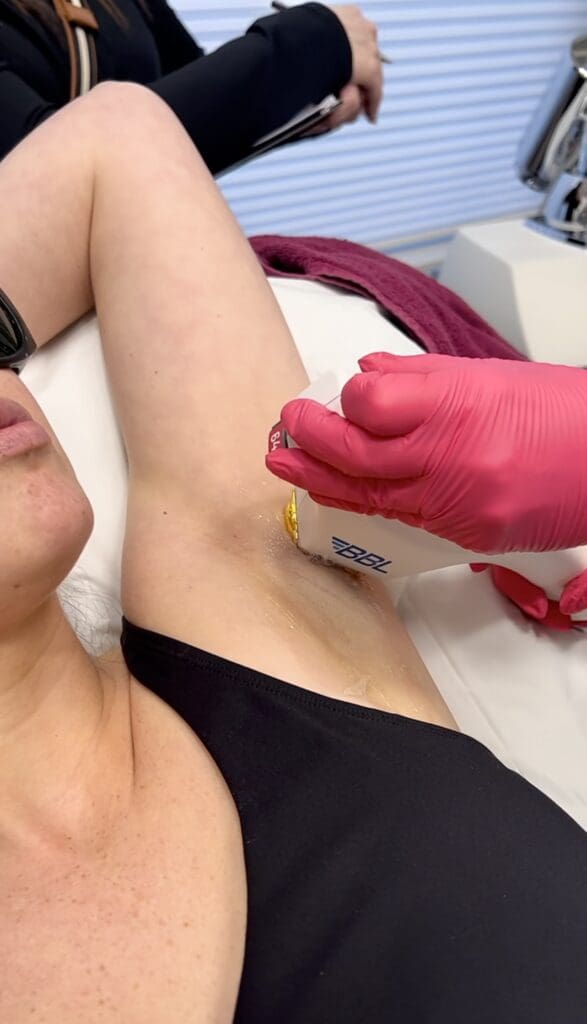Laser Hair Removal vs. Waxing: Digging Deeper into Dr. Bowles’ Byrdie Feature
We’re thrilled to see our provider, Dr. Alexandra Bowles, featured in a recent article on Byrdie: “Laser Hair Removal vs. Waxing: Which Is Best for You?”
Expanding on her insights revealed in the interview with Byrdie, Dr. Bowles is sharing the inside scoop on these two treatments and how you can choose which one is best for you.

What Is Laser Hair Removal?
Laser hair removal is a cosmetic procedure that uses a laser (also known as concentrated beams of light) to remove unwanted hair. The laser emits light that is absorbed by the pigment (or melanin), found in the hair follicles, which in turn delays future hair growth.
What Is Waxing?
Waxing is a semi-permanent hair removal method that is easy and efficient, leaving the skin feeling smooth and soft. Waxing allows for a more effective removal of the entire hair with the root, from the follicle, as opposed to shaving. There are different types of wax such as:
- Soft wax, also known as strip waxing
- Hard wax, which is directly applied onto the skin, cooled for a few minutes, and then pulled and removed in the opposite direction of the hair growth
- Fruit wax, which works well for sensitive skin
- Chocolate wax which works well for skin prone to irritation and redness
- Sugar wax, a more natural option for hair removal for people with sensitive skin
What results to expect for both?
The most major difference is that laser hair removal is semi-permanent or in some cases permanent. Waxing must be performed regularly as the hair regrows. Each process of hair removal has its own benefits and drawbacks in terms of lasting quality, effectiveness, and potential side effects.
Laser hair removal offers a long-term reduction in hair growth and precision targeting of unwanted hair. Plan for several treatments, typically 5-8, for optimal reduction; and maintenance treatments every year or so. Laser hair removal has minimal discomfort and temporary redness or swelling in the treated area. In some cases, skin pigmentation or scarring can occur during and after the procedure. However, seeing a well-trained provider will reduce this risk as they will be able to choose the proper laser and settings for your skin tone. They can also perform a spot test when necessary.
Waxing on the other hand provides immediate results, with smoother skin right after the procedure. However, the results from waxing are temporary in that hair usually grows back within a few weeks. Waxing can be painful, especially with sensitive skin. It can cause side effects such as redness, skin irritation, and ingrown hairs.
What skin or hair types are best for laser hair removal vs. waxing?
People with lighter pigmented hair such as blonde or red, are not a candidate for laser hair removal. This is because the laser targets the pigment in the hair follicle and lighter hair types lack the pigment needed for the laser to work. Waxing or plucking is a good choice for people with this hair type. Individuals with darker hair are good candidates for laser hair removal. It is very important to note that plucking or waxing hair prior to a laser hair removal session is not recommended. This removes the hair follicle entirely, so there is nothing for the laser to target. Dermaplaning or shaving prior to laser hair removal is recommended though, as treating an area with long hair can impede the laser’s ability to get into the follicle.
In contrast, waxing comes in different forms that can be used for hair removal, depending on an individual’s preference. Soft wax, also known as strip waxing, is ideal for removing tiny, fine strands of hair you can’t see. It is usually used on larger areas of the body, applied directly to the skin, and removed by a strip of cloth. Hard wax is used for smaller and more sensitive areas like the upper lip, underarms, and bikini area. This form of wax is applied warm and directly on the skin, and once hardened, is peeled off. Fruit wax is similar to hard body wax but is recommended mostly for people with sensitive skin.
What is the pain level for both treatments?
When it comes to laser hair removal, the pain level or discomfort is usually tolerable for most individuals. Most people feel a mild stinging or tingling sensation during the procedure. Sometimes we will use topical numbing cream in certain areas to provide more comfort. Waxing, on the other hand, is generally considered more painful. This is especially true in areas of the body like the bikini area, underarms, and upper lip that are more sensitive.

What is the cost for both treatments?
The cost of a laser hair treatment really depends on two factors, treatment area and permanence. Typically, larger treatment areas like the back or legs can cost more than smaller areas. While laser hair removal is a more permanent option than waxing, you will still have to get some maintenance treatments. If you follow your complete treatment plan, including maintenance, this could last between 6 to 12 months or longer. This can cost more initially, but can end up being a worthwhile investment down the road. Waxing, on the other hand, is less costly than laser hair removal per treatment. However, waxing is not a permanent hair removal solution. The cost of getting routine wax treatments for several years can end up being more costly than laser treatment in the end.
What is aftercare like for both treatments?
The aftercare for laser hair removal requires individuals to avoid being exposed to the sun, heat, and irritants. This includes hot baths, steam rooms, and saunas. It is also recommended to resist the urge to scratch or pick at the treated area. Similarly, for waxing, individuals are encouraged to avoid sun exposure to prevent sunburn and minimize the risk of post-inflammatory hyperpigmentation. Exfoliating gently, moisturizing regularly, and avoiding tight clothing around the waxed area are also ways to reduce the risk of irritation, redness, and dryness of the skin.
What is the frequency of treatment for both?
Most patients have laser hair removal sessions once every 4 to 6 weeks. This varies depending on the rate of hair regrowth and also on the treatment area. The hair growth cycle for the face is usually faster so patients might start with a visit every 2 weeks. The body, on the other hand, is typically every 4 weeks. Similarly, for waxing, hair growth is faster in areas like the eyebrows, bikini line, and underarms. For these areas, you will require a wax session every 2-3 weeks. The time between sessions allows for the hair to regrow to a waxable length. In contrast, legs will typically require a waxing session every 3 to 5 weeks.
Final Thoughts: Which treatment does Dr. Alexandra recommend?
I would recommend laser hair removal as I feel it is a safe and effective way to provide long lasting hair reduction. While it is an investment upfront, the time and money you would save from years of waxing is something important to consider. I also feel that over-waxing some areas can cause permanent discoloration, while laser hair removal does not do this if the treatments are performed properly. It’s very important to get a consultation with a knowledgeable provider who has treated patients with your skin type and to do a test spot if there is a concern of hyperpigmentation. All in all, laser hair removal is a great choice for everyone!
